Patho 370 test 6 Study guides, Class notes & Summaries
Looking for the best study guides, study notes and summaries about Patho 370 test 6? On this page you'll find 38 study documents about Patho 370 test 6.
All 38 results
Sort by
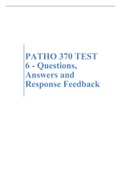
-
PATHO 370 TEST 6 - Questions, Answers and Response Feedback
- Exam (elaborations) • 18 pages • 2023
- Available in package deal
-
- $14.49
- 1x sold
- + learn more
• Question 1 0.125 out of 0.125 points The finding of hypotension, rigid abdomen, and absent bowel sounds in a patient with pancreatitis Selected Answer: a. indicates peritonitis with substantial risk for sepsis and shock. Correct Answer: a. indicates peritonitis with substantial risk for sepsis and shock. Response Feedback: In acute pancreatitis, fever is common but is usually low-grade initially. In more severe pancreatitis, hypotension, rigid abdomen, and absent bowel sounds are present. Hy...
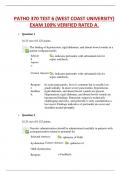
-
PATHO 370 TEST 6 (WEST COAST UNIVERSITY) EXAM 100% VERIFIED RATED A
- Exam (elaborations) • 33 pages • 2024
- Available in package deal
-
- $17.49
- + learn more
PATHO 370 TEST 6 (WEST COAST UNIVERSITY) EXAM 100% VERIFIED RATED A
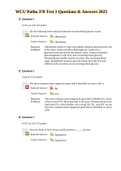
-
WCU Patho 370 Test 1 Questions & Answers 2023.
- Exam (elaborations) • 31 pages • 2023
-
- $10.99
- 1x sold
- + learn more
WCU Patho 370 Test 1 Questions & Answers 2023. Question 1 0.125 out of 0.125 points All the following stress-induced hormones increase blood glucose except Selected Answer: c. aldosterone. Correct Answer: c. aldosterone. Response Feedback: Aldosterone results in water and sodium retention and potassium loss in the urine. It does not affect blood glucose. Cortisol is a glucocorticoid secreted by the adrenal cortex. Cortisol stimulates gluconeogenesis in the liver, thus increasing b...
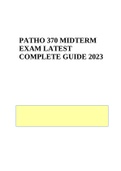
-
PATHO 370 MIDTERM EXAM LATEST COMPLETE SOLUTION 2023/2024 (Graded A+)
- Exam (elaborations) • 58 pages • 2023
- Available in package deal
-
- $16.49
- 1x sold
- + learn more
PATHO 370 MIDTERM EXAM LATEST COMPLETE GUIDE 2023. PATHO 370 Pathophysiology. Gas exchange occurs in which of the respiratory system's structures? Selected Answer: Trache a Correct Answer: Alveoli Response Feedback: The alveoli allow air to come in indirect contact with the bloodstream through the pulmonary capillary system. This alveolar membrane, which is one cell thick, allows carbon dioxide to diffuse into the alveoli from the bloodstream and oxygen to diffuse to the bloodstream ...
PATHO 370 Test 6 Exam Questions and Answers - West Coast U

-
PATHO 370 Test 6 Exam Questions and Answers - West Coast University
- Exam (elaborations) • 18 pages • 2022
- Available in package deal
-
- $30.48
- + learn more
PATHO 370 Test 6 Exam Questions and Answers - West Coast University Question 1 0.125 out of 0.125 points The finding of hypotension, rigid abdomen, and absent bowel sounds in a patient with pancreatitis Selected Answer: a. indicates peritonitis with substantial risk for sepsis and shock. Correct Answer: a. indicates peritonitis with substantial risk for sepsis and shock. Response Feedback: In acute pancreatitis, fever is common but is usually low-grade initially. In ...
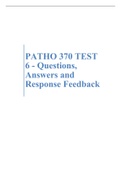
-
PATHO 370 TEST 6 - Questions, Answers and Response Feedback
- Exam (elaborations) • 18 pages • 2023
- Available in package deal
-
- $14.49
- + learn more
• Question 1 0.125 out of 0.125 points The finding of hypotension, rigid abdomen, and absent bowel sounds in a patient with pancreatitis Selected Answer: a. indicates peritonitis with substantial risk for sepsis and shock. Correct Answer: a. indicates peritonitis with substantial risk for sepsis and shock. Response Feedback: In acute pancreatitis, fever is common but is usually low-grade initially. In more severe pancreatitis, hypotension, rigid abdomen, and absent bowel sounds are present. Hy...
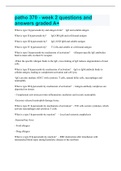
-
patho 370 - week 2 questions and answers graded A+
- Exam (elaborations) • 14 pages • 2023
- Available in package deal
-
- $27.59
- 1x sold
- + learn more
patho 370 - week 2 questions and answers graded A+ What is type I hypersensitivity and antigen form? IgE and soluble antigen What is type II hypersensitivity? IgG OR IgM and cell-bound antigen What is type III hypersensitivity? IgG AND IgM and soluble antigen What is type IV hypersensitvity? T Cells and soluble or cell-bound antigen What is type I hypersensitivity mechanism of activation? -Allergen-specific IgE antibodies bind to mast cells via their Fc receptor...

-
PATHO 370 TEST 3 Questions With Answers Latest Updated 2024 (GRADED)
- Exam (elaborations) • 19 pages • 2024
-
- $17.99
- + learn more
PATHO 370 TEST 3 Questions With Answers Latest Updated 2024 (GRADED) Administration of which therapy is most appropriate for hypovolemic shock? Selected Answer: c. Crystalloids Correct Answer: c. Crystalloids Response Feedback: Crystalloids are solutions that contain electrolytes. Isotonic solutions, such as lactated Ringers, are commonly used crystalloid solutions. These solutions are preferred for volume resuscitation, because they remain in the extracellular space and are more effecti...
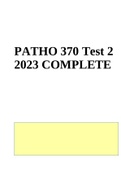
-
PATHO 370 Test 2 2023 COMPLETE
- Exam (elaborations) • 33 pages • 2023
-
- $15.49
- + learn more
PATHO 370 Test 2 2023 COMPLETE. PATHO 370 PATHOPHYSIOLOGY. Which vessel normally demonstrates the most rapid blood flow? Selected Answer: c. The vena cava Correct Answer: c. The vena cava Response Feedback: The vena cava has the most rapid rate of flow. Arterioles don’t offer the most rapid blood flow. Capillaries are composed of a single thickness of endothelial cells attached to a protein network called the basement membrane and don’t offer the most rapid blood flow. A venule begi...

Study stress? For sellers on Stuvia, these are actually golden times. KA-CHING! Earn from your study resources too and start uploading now. Discover all about earning on Stuvia



